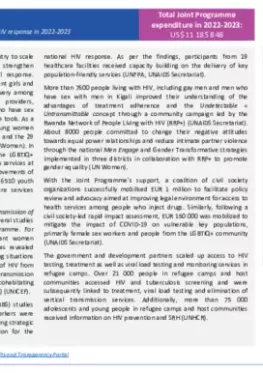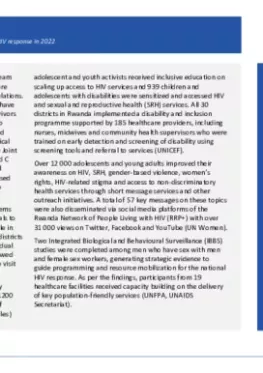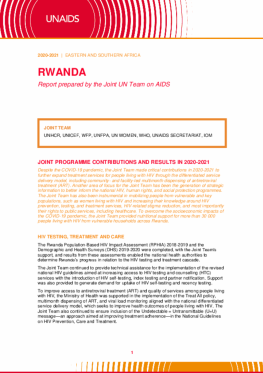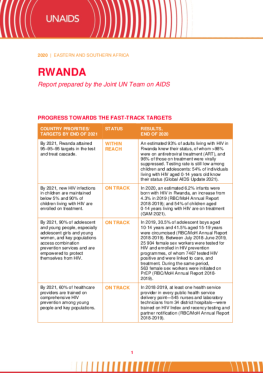|
Rwanda
In Rwanda, the Joint Programme support enabled the country to scale up HIV services among vulnerable and key populations and strengthen evidence and community engagement for the national response. Community-led monitoring and reporting tools for adolescent girls and young women were implemented to improve service delivery among this group. In addition, 200 community-based service providers, including peer educators, female sex workers and men who have sex with men had orientation on service delivery and using these tools. As a result, over 600 people, primarily adolescent girls and young women were identified, of whom close to 500 accessed HIV testing and the 29 people who tested positive were enrolled on treatment (UN Women). In Kigali city, 550 female sex workers and people from the LGBTIQ+ community accessed HIV and sexually transmitted infection services at local healthcare facilities. Besides, leaders from 26 youth movements of the Rwanda Interfaith Council on Health in Kigali mobilized 6510 youth leaders to fast-track HIV prevention, treatment and care services through youth networks (UNAIDS Secretariat).
Evidence for the National Prevention of Mother-to-Child Transmission of HIV programme is stronger thanks to the completion of several studies with technical and financial support from the Joint Programme. For instance, surveillance of HIV and syphilis among pregnant women attending antenatal care and vertical transmission services revealed higher HIV prevalence in specific age groups and certain living situations (UNFPA). In addition, a first study on vertical transmission of HIV from mothers infected during pregnancy revealed a 5.6% overall transmission rate, with higher rates among women aged 24-34 (6.6%), cohabitating mothers (12.5%), and those with fewer antenatal visits (6.1%) (UNICEF).
Two Integrated Biological and Behavioural Surveillance (IBBS) studies among men who have sex with men and female sex workers were completed by the Rwanda Biomedical Centre (RBC), generating strategic evidence to guide programming and resource mobilization for the national HIV response. As per the findings, participants from 19 healthcare facilities received capacity building on the delivery of key population-friendly services (UNFPA, UNAIDS Secretariat).
More than 7600 people living with HIV, including gay men and men who have sex with men in Kigali improved their understanding of the advantages of treatment adherence and the Undetectable = Untransmittable concept through a community campaign led by the Rwanda Network of People Living with HIV (RRP+) (UNAIDS Secretariat). About 8000 people committed to change their negative attitudes towards equal power relationships and reduce intimate partner violence through the national Men Engage and Gender Transformative strategies implemented in three districts in collaboration with RRP+ to promote gender equality (UN Women).
With the Joint Programme’s support, a coalition of civil society organizations successfully mobilised EUR 1 million to facilitate policy review and advocacy aimed at improving legal environment for access to health services among people who inject drugs. Similarly, following a civil society-led rapid impact assessment, EUR 150 000 was mobilized to mitigate the impact of COVID-19 on vulnerable key populations, primarily female sex workers and people from the LGBTIQ+ community (UNAIDS Secretariat).
The government and development partners scaled up access to HIV testing, treatment as well as viral load testing and monitoring services in refugee camps. Over 21 000 people in refugee camps and host communities accessed HIV and tuberculosis screening and were subsequently linked to treatment, viral load testing and elimination of vertical transmission services. Additionally, more than 75 000 adolescents and young people in refugee camps and host communities received information on HIV prevention and SRH (UNHCR).





